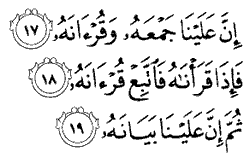Arranging The Book, Closer to Allah, I Don't Know
Issue 889 » April 8, 2016 - Rajab 1, 1437
Living The Quran
Arranging The Book
Al-Qiyama (The Resurrection) - Chapter 75: Verses 17-19
 "It is for Us to collect it [in your heart] so you may recite [and compile it]. But when We have recited it, follow its recital [as promulgated]: Nay more, it is for Us to explain it [through your tongue]."
"It is for Us to collect it [in your heart] so you may recite [and compile it]. But when We have recited it, follow its recital [as promulgated]: Nay more, it is for Us to explain it [through your tongue]."
It is commonly acknowledged that the arrangement of ayat (verses) and suras (chapters) in the Quran is unique. The layout does not follow the chronological order of revelation, nor does it follow subject matter. What secret lies behind this arrangement is best known to Allah, for it is His Book. Now if I play the unscrupulous editor and re-arrange the words of someone else's book, changing the sequence of the sentences etc., then altering the entire meaning of the work becomes tremendously easy. This end product can no longer be attributed to the original author, since only the author himself is entitled to change the wording and the material if the rightful claim of authorship is to be preserved.
So it is with the Book of Allah, for He is the sole Author and He alone has the right to arrange the material within His Book. The Qur'an is very clear about this.
Only the Prophet, through divine privilege and revelation, was qualified to arrange verses into the unique fashion of the Quran, being the only privy to the Will of Allah. Neither the Muslim community at large nor anyone else had any legitimate say in organising the Book of Allah.
Compiled From:
"The History of the Quranic Text" - Muhammad Mustafa Al-Azami, p. 70
Understanding The Prophet's Life
Closer to Allah
There are many hadith of the Prophet (peace be upon him) that demonstrate the importance of the late-night prayer (tahajjud). These hadith include the following:
"The best prayer after the obligatory prayer is that during the depths of the night." [Muslim]
"You should perform the late-night prayer for verily it was the custom of the pious people before you. Certainly, the late-night prayer is an act that takes one closer to Allah, keeps one away from sins, expiates for evil deeds and repels disease from the body." [Tirmidhi]
There are many aspects that make the late-night prayer special. First and foremost, it is a prayer. The best action or matter is prayer.
Second, al-Haitami points out that, in general, the prayer said in the late night is more virtuous than the voluntary prayers during the day because it is further from ostentation and being done for show. Furthermore, it is easy to have the fear of Allah and concentrate on the prayer in the late-night prayer as there are fewer disturbances at that time.
This is perhaps one of the greatest aspects of the late-night prayers. It increases one's sincerity to Allah. It also makes the person realize his real purpose and goal in this life. He is getting up in the middle of the night and forsaking his sleep because he realizes that his goal is not the pleasure or relaxation of this world. Instead, he has a much greater purpose and goal in life. For that reason, he is getting up to pray when the rest of mankind — especially those whose only concern is this life — are neither sleeping or committing sins under the cover of night.
Compiled From:
"Commentary on the Forty Hadith of al-Nawawi" - Jamaal al-Din M. Zarabozo, Vol. 2, pp. 904, 905
Blindspot!
I Don't Know
It is one of the most difficult skills to master, but it is essential for those who wish to speak about religious matters.
You are confronted with a question. You are in a position where an answer is expected of you. It is something a person in your position should not be ignorant of. Your reputation is at stake. The matter pertains to Allah, the tenets of religion, or something affecting someone else’s rights. You do not want to look uninformed or be thought a fool.
What do you do?
The greatest minds of the past knew what to do. They would say: “I don’t know.”
Malik is one of the greatest scholars in Muslim history. He was humble and God fearing when it came to religious knowledge. He would only speak about what he knew. Haytham b. Jamil said: “I once listened as Imam M?lik was asked forty-eight questions. He answered thirty-two of them by saying: ‘I do not know.’ He answered the other sixteen with what he knew.”
Malik used to say: “The words ‘I do not know’ are the scholar’s shield. If he loses them, he will be lethally wounded.”
Ibn Abd al-Barr, one of the greatest Maliki jurists, relates that the Prophet’s Companion Abu al-Darda used to say: “To say ‘I do not know’ is half of all knowledge.”
The key to being able to say “I do not know” is humility. If a person’s concern in seeking knowledge is fame and fortune, it becomes an extremely difficult thing to do.
If a person’s concern is for knowledge itself and for Allah’s pleasure, it becomes the easiest thing to say “I don’t know.”
Compiled From:
"Learn to Say: 'I Do Not Know'" - Salman al-Oadah